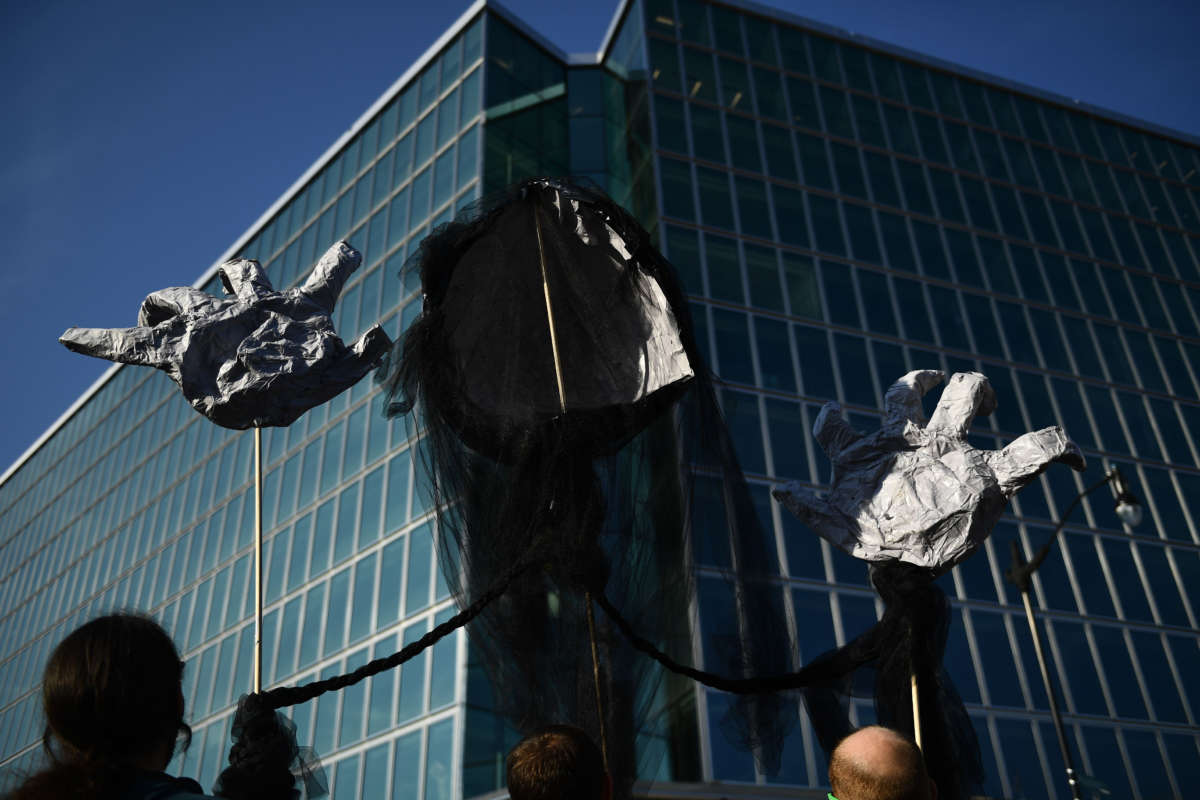Honest, paywall-free news is rare. Please support our boldly independent journalism with a donation of any size.
Over the past five years, organizers in seven Ohio communities (three cities, four counties) have qualified ballot measures to recognize enforceable rights of ecosystems and human rights to water. All take the historic and bold step of elevating these basic rights above the legal privileges currently enjoyed by private corporations in the United States.
The local laws seek to halt fracking and accompanying fossil fuel infrastructure projects. So it’s no wonder the American Petroleum Institute (API) — perhaps the most influential fossil fuel lobby in the nation — is getting involved.
After being repeatedly and systematically denied access to the ballot — with exception, after two trips to the Ohio Supreme Court, of the famous Lake Erie Bill of Rights — petitioners, supported by my organization, the Community Environmental Legal Defense Fund, filed a federal civil rights lawsuit, arguing the petitioners’ rights to free speech, due process and separation of powers have been violated. (The lawsuit has since gained official amicus support from the Earth Law Center, Move to Amend and a coalition of grassroots groups in Ohio that represents over 18,000 members.)
In their defense of the lawsuit, Earth Law Center wrote, “Importantly, many progressive ideas are masked behind the misconceived notion that they are unconstitutional.”
Being able to vote on new ideas allows for nonviolent theories of change, amicus briefs wrote.
“Given the subject matter of some of the ballot initiatives,” the API wrote in an email, the Institute decided to get involved in this case.
The API is joined by other industry groups in their opposition to the petitioners’ lawsuit, including the Ohio Chamber of Commerce. Their motivations are clear. In the opposition brief, they write that they are “deeply concerned about this lawsuit because the initiatives that Plaintiffs have sought to place on the ballots in seven different Ohio counties include limitations or outright bans on many of the lawful activities that members of amici curiae either participate in or support. If this Court holds that the initiatives should be (or should have been) submitted to the electorate, and if the initiatives are ultimately passed, [we] will suffer serious, immediate, and substantial effects.”
Of course, they are concerned. Their corporate “rights” are being challenged.
The industry groups are being represented by the same law firm that helped Trump file the election appeal in Pennsylvania. Apparently, protecting democracy is only important when it serves the interests of the 1 percent and not when it is by and for the people.
“Ours is one more collective struggle for voting rights to protect ourselves and future generations from chemical and fossil energy pollution,” says Jerry Dolcini, a petitioner with the Medina County, Ohio, effort. “Our small effort is of planetary importance.”
“The courts have allowed the state to get away with a multitude of deceptive and arguably illegal tactics and laws, while holding residents who gathered enough signatures to place a measure on the ballot, to unreasonable, and, most importantly, unpredictable and arbitrary standards,” says Terry Lodge, lead attorney on the lawsuit for the Community Environmental Legal Defense Fund.
Though all of the measures gathered the required number of signatures and jumped over all the proper administrative procedural hurdles, they were not allowed on the ballot. This is an attack on direct democracy protections within the Ohio Constitution.
“Weeks, months, and years of researching facts, giving talks, organizing community water testing, poring over county documents, discussing county charters with community members, only to have our citizen initiatives trashed by public officials supposed to serve the public have fired me up to dismantle this corrupt system and rebuild a real democracy,” says Gwen B. Fischer, an organizer with the Portage County effort.
One sister initiative that was ultimately placed on the ballot, after repeated court battles and pressure by the people, was the Lake Erie Bill of Rights. Since it was adopted, the law has made international headlines, inspired people across the globe, elicited backlash from corporate interests and expanded many peoples’ concept of what is possible right now.
The industry does not want a flurry of similar initiatives making it to the ballot. They want to avoid the public discussions and debates that take place during campaigns about nature’s and peoples’ rights in opposition to corporations’ “rights” to make profits. They understand the political and cultural repercussions of these conversations and votes.
That’s also why reactionary legislation was just introduced in Missouri that tries to ban the representation of ecosystems in court.
It’s why the API wants to stop the initiatives before anyone hears about them.
If courts accept the API’s logic, it could be a blow to direct democracy powers — an important tool for social movements that have been shut out of the halls of power through gerrymandering, voter suppression and state governments’ interference in local democracy.
We cannot let these tactics stifle our imagination. We have to keep pushing.
We can change the law, and we must. As Robin Kimmerer, author of Braiding Sweetgrass, recently said, “law is how we use power to make our values real in the world. We have to change the paradigm … as we imagine a future where Rights of Nature take precedence.”
Let’s keep pushing.
Matching Opportunity Extended: Please support Truthout today!
Our end-of-year fundraiser is over, but our donation matching opportunity has been extended! All donations to Truthout will be matched dollar for dollar for a limited time.
Your one-time gift today will be matched immediately. Your monthly donation will be matched for the whole first year, doubling your impact.
This matching gift comes at a critical time. As Trump attempts to silence dissenting voices and oppositional nonprofits, reader support is our best defense against the right-wing agenda.
Help Truthout confront Trump’s fascism in 2026, and have your donation matched now!
